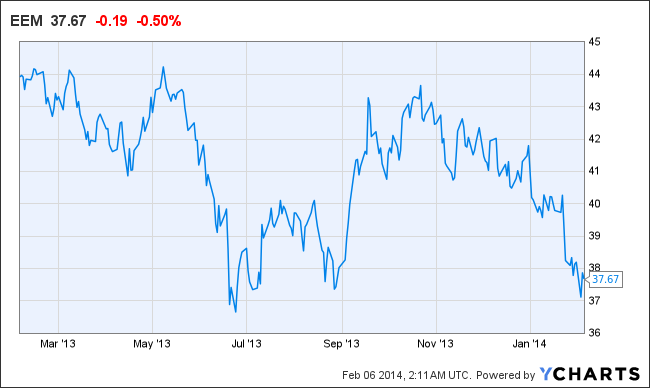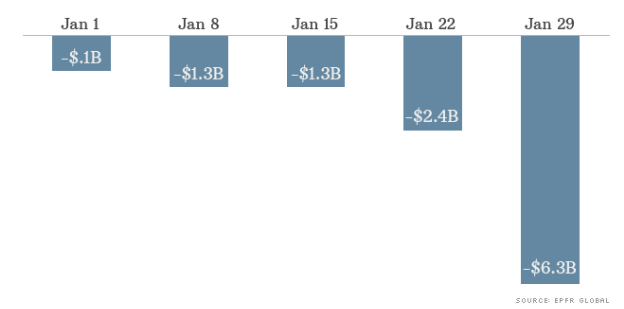Emerging markets have given investors nothing but pain so far this year. A toxic mix of rising interest rates in the U.S., fears of a slowdown in China, and political turmoil have crushed stock prices and currencies in developing markets from Argentina to Thailand.
The next chart pretty much says it all. Just take a look at the dismal performance of a popular ETF: iShares MSCI Emerging Markets Index (EEM).
Some analysts worry that the downturn in emerging markets may even pose a contagion risk to Europe, where banks have loaned in excess of $3 trillion to emerging markets, more than four times U.S. lenders, according to Deutsche Bank.
“We think EM (emerging markets) shocks are a real concern for 2014,” as Matt Spick, an analyst at Deutsche Bank, told Reuters. “When currency (volatility) combines with revenue slowdowns and rising bad debts, we see compounding threats to the exposed banks.”
Small wonder, then, that fund investors dumped emerging market stocks in January. Sizemore Global Macro portfolio manager Charles Sizemore said in a recent interview with FOX Business that the hot money that flowed into emerging markets in search of higher yields and returns is now reversing direction as the Federal Reserve scales back its stimulus.
Emerging market stock fund weekly outflows
Optimists argue that the sell-off is overdone, and may even offer investors a golden opportunity to buy quality stocks on the cheap.
Barry Ritholtz, CEO of online quantitative research firm Fusion IQ and author of the widely read The Big Picture blog, thinks the washout in emerging markets will yield some huge bargains. (He’s also bullish on Europe.) In a recent interview, he argued that:
“If Europe is cheap, emerging markets are really cheap. The question is: How much cheaper are they going to get? Is there room for more downside? Definitely. But based on valuation and the fairly overwhelming negative sentiment…we don’t really care about being a few months early.”
If you agree with his take, Ritholtz recommends the iShares Emerging Markets Dividend ETF (DVYE). The reason: It is far less exposed to bank stocks, which are really getting hammered, than the iShares MSCI Emerging Markets (EEM).
At the same time, the emerging market currency declines against the dollar and euro could eventually have a big upside. The big expansion in world central bank balance sheets after the financial crisis increased the value of emerging market currencies, hurting exports. That money is starting to retreat now, but the export competitiveness of emerging markets has come back.
As Shawn Tully, an editor at large at Fortune, points out:
“That trend hammered the competitiveness of manufacturers in the developing world in the battle for market share with European and U.S. producers. A return to currencies whose value is set by market forces, rather than heavy-handed intervention, could actually be a boon to emerging markets.”
Though some investors worry about China’s banking system and political instability, the country still remains a huge middle class expansion growth story, though a slightly less spectacular one than last decade. The International Monetary Fund sees the Chinese economy growing 7.5% in 2014 and 7.3% the following year.
Covestor manager Sherman Lee, who oversees the Prudent Value portfolio, likes China’s travel sector and Internet space. His picks: Ctrip.com (CTRP) and Baidu.com (BIDU), a Chinese language-search engine for websites, audio files and images.
Photo Credit: Ratchaprasong
DISCLAIMER: The investments discussed are held in client accounts as of January 31, 2013. These investments may or may not be currently held in client accounts. International investing involves special risks, such as political instability and currency fluctuations. The reader should not assume that any investments identified were or will be profitable or that any investment recommendations or investment decisions we make in the future will be profitable. Past performance is no guarantee of future results.







